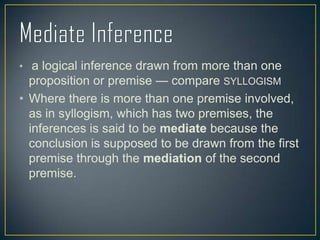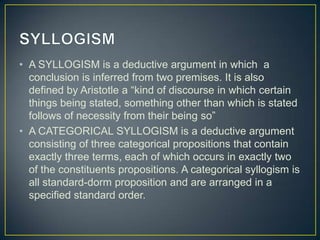Logic
- 1. GILMORE S. REYES JHAMIL CARLO C. BRIONES
- 2. • a logical inference drawn from more than one proposition or premise — compare SYLLOGISM • Where there is more than one premise involved, as in syllogism, which has two premises, the inferences is said to be mediate because the conclusion is supposed to be drawn from the first premise through the mediation of the second premise.
- 3. • A SYLLOGISM is a deductive argument in which a conclusion is inferred from two premises. It is also defined by Aristotle a “kind of discourse in which certain things being stated, something other than which is stated follows of necessity from their being so” • A CATEGORICAL SYLLOGISM is a deductive argument consisting of three categorical propositions that contain exactly three terms, each of which occurs in exactly two of the constituents propositions. A categorical syllogism is all standard-dorm proposition and are arranged in a specified standard order.
- 4. • Major term- the term that occurs as the predicate of the conclusion • Middle Term- the third term of the syllogism, which does not occur in the conclusion, appearing in both premises. • Minor term- the term that occurs of the subject term of the conclusion • Major Premise- the premise containing the major term • Minor Premise- the premise containing the minor term
- 5. All soldiers are men. All heroes are soldiers. Therefore, All heroes are men. Major Term- Men Middle term- Soldier Minor Term- Heroes Major Premise- First Premise Minor Premise- Second Premise
- 6. Some form of killing are evil. Abortion is a form of killing >Abortion is evil Major Term- Evil Middle term- Form of Killing Minor Term- Abortion Major Premise- First Premise Minor Premise- Second Premise
- 7. All Men are mortal. All Greek are men. >All Greek are mortal. Major Term- Mortal Middle term- Men Minor Term- Greeks Major Premise- First Premise Minor Premise- Second Premise
- 8. Every Dog is an animal. Every hound is a Dog. >Every hound is an animal. Major Term- Animal Middle term- Dog Minor Term- Hound Major Premise- First Premise Minor Premise- Second Premise
- 9. SPECIAL THANKS! To our instructor: DR. SAN ANDRES









